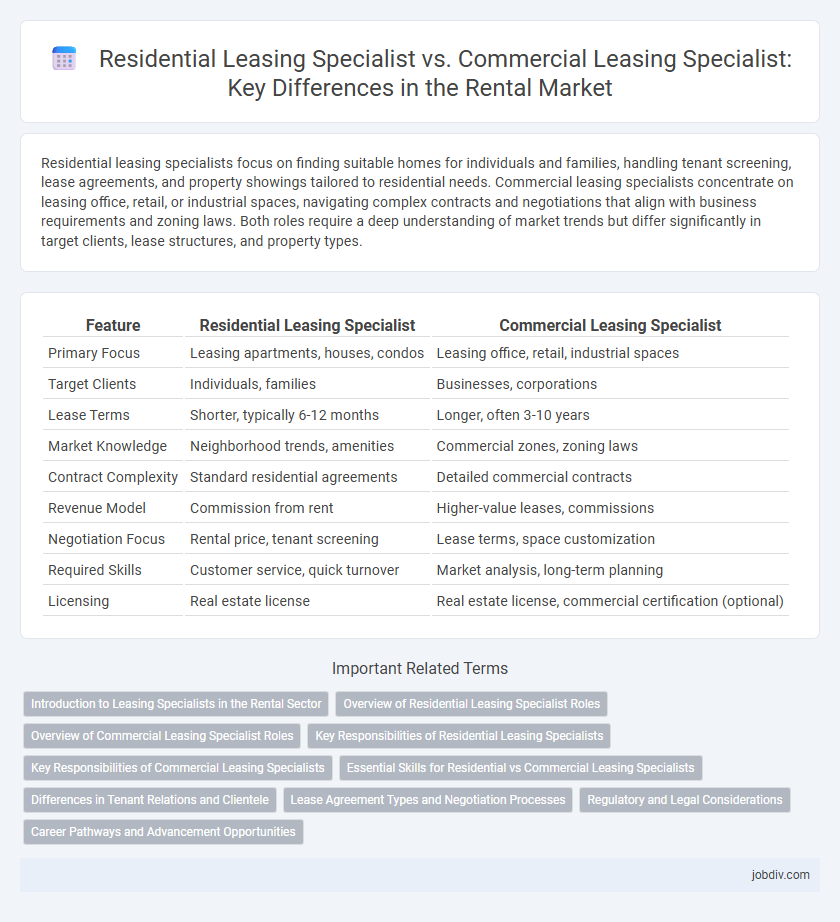Residential leasing specialists focus on finding suitable homes for individuals and families, handling tenant screening, lease agreements, and property showings tailored to residential needs. Commercial leasing specialists concentrate on leasing office, retail, or industrial spaces, navigating complex contracts and negotiations that align with business requirements and zoning laws. Both roles require a deep understanding of market trends but differ significantly in target clients, lease structures, and property types.
Table of Comparison
| Feature | Residential Leasing Specialist | Commercial Leasing Specialist |
|---|---|---|
| Primary Focus | Leasing apartments, houses, condos | Leasing office, retail, industrial spaces |
| Target Clients | Individuals, families | Businesses, corporations |
| Lease Terms | Shorter, typically 6-12 months | Longer, often 3-10 years |
| Market Knowledge | Neighborhood trends, amenities | Commercial zones, zoning laws |
| Contract Complexity | Standard residential agreements | Detailed commercial contracts |
| Revenue Model | Commission from rent | Higher-value leases, commissions |
| Negotiation Focus | Rental price, tenant screening | Lease terms, space customization |
| Required Skills | Customer service, quick turnover | Market analysis, long-term planning |
| Licensing | Real estate license | Real estate license, commercial certification (optional) |
Introduction to Leasing Specialists in the Rental Sector
Residential leasing specialists focus on managing rental agreements for apartments, houses, and condos, ensuring tenant screening, lease negotiations, and property showings are efficiently handled. Commercial leasing specialists deal with leasing office buildings, retail spaces, and industrial properties, requiring expertise in longer lease terms, zoning laws, and business tenant needs. Both roles demand strong negotiation skills and market knowledge but serve distinct client bases within the rental sector.
Overview of Residential Leasing Specialist Roles
Residential Leasing Specialists manage rental agreements for apartments, condos, and single-family homes, focusing on tenant screening, lease negotiations, and rent collection. They ensure compliance with housing laws and maintain strong tenant relationships to reduce vacancy rates and enhance tenant retention. Their expertise lies in residential property management, market rent analysis, and coordinating property maintenance.
Overview of Commercial Leasing Specialist Roles
Commercial Leasing Specialists manage property leases for retail, office, and industrial spaces, tailoring agreements to business needs and market trends. They conduct detailed market analyses, negotiate lease terms, and coordinate with tenants and property owners to maximize occupancy and profitability. Expertise in zoning laws, commercial property valuation, and tenant improvements is critical to their role.
Key Responsibilities of Residential Leasing Specialists
Residential Leasing Specialists manage tenant relations, property showings, lease agreements, and rent collections for housing units, ensuring compliance with local housing laws. They conduct market analysis to set competitive rental rates and coordinate maintenance requests to maintain property conditions. Their focus lies in residential tenant satisfaction and occupancy optimization, differing from Commercial Leasing Specialists who handle business property leases and complex negotiations.
Key Responsibilities of Commercial Leasing Specialists
Commercial Leasing Specialists manage lease negotiations, tenant relations, and property marketing for retail, office, and industrial spaces. They conduct detailed market analysis, financial evaluations, and lease structuring to maximize property income and ROI. Expertise in zoning laws, commercial real estate trends, and contract law is essential to ensure compliance and protect landlord interests.
Essential Skills for Residential vs Commercial Leasing Specialists
Residential leasing specialists excel in customer service, property management knowledge, and tenant relations, focusing on single-family homes and apartments. Commercial leasing specialists require expertise in contract negotiation, market analysis, and understanding zoning laws to manage office, retail, or industrial spaces. Both roles demand strong communication skills, but commercial leasing emphasizes financial acumen and strategic business development.
Differences in Tenant Relations and Clientele
Residential leasing specialists primarily manage tenant relations with individual renters, addressing personal lease concerns and ensuring smooth communication for housing needs in apartments or single-family homes. Commercial leasing specialists deal with business clients, requiring expertise in negotiating leases for office, retail, or industrial spaces while understanding complex contractual terms and long-term tenant-business relationships. The clientele difference influences communication style, lease flexibility, and service expectations unique to residential versus commercial property markets.
Lease Agreement Types and Negotiation Processes
Residential Leasing Specialists primarily handle standard lease agreements focused on fixed-term and month-to-month residential contracts, emphasizing tenant rights and habitability clauses. Commercial Leasing Specialists negotiate complex, customizable lease agreements tailored to business needs, often involving longer terms, options for renewal, and detailed provisions on maintenance, improvements, and use restrictions. The negotiation process in commercial leasing requires advanced knowledge of market conditions, legal implications, and financial analysis, whereas residential leasing focuses more on regulatory compliance and tenant-landlord relationship clarity.
Regulatory and Legal Considerations
Residential leasing specialists navigate strict tenant protection laws, such as security deposit limits and habitability standards, ensuring compliance with local and federal residential rental regulations. Commercial leasing specialists manage complex contractual terms, zoning laws, and environmental regulations specific to business property, requiring expertise in negotiation and legal risk assessment. Both roles demand thorough knowledge of lease agreements, but commercial leasing typically involves more intricate legal frameworks due to the nature of business operations and property use.
Career Pathways and Advancement Opportunities
Residential leasing specialists typically begin their careers managing apartments and single-family homes, gaining expertise in tenant relations and property maintenance, which can lead to roles such as property manager or leasing coordinator. Commercial leasing specialists focus on office, retail, or industrial spaces, developing skills in contract negotiation, market analysis, and tenant acquisition, paving the way toward senior roles like leasing manager or commercial real estate broker. Career advancement in both fields often depends on building a strong client network, obtaining relevant certifications like Certified Property Manager (CPM) or Certified Commercial Investment Member (CCIM), and demonstrating success in lease portfolio growth.
Residential Leasing Specialist vs Commercial Leasing Specialist Infographic

 jobdiv.com
jobdiv.com